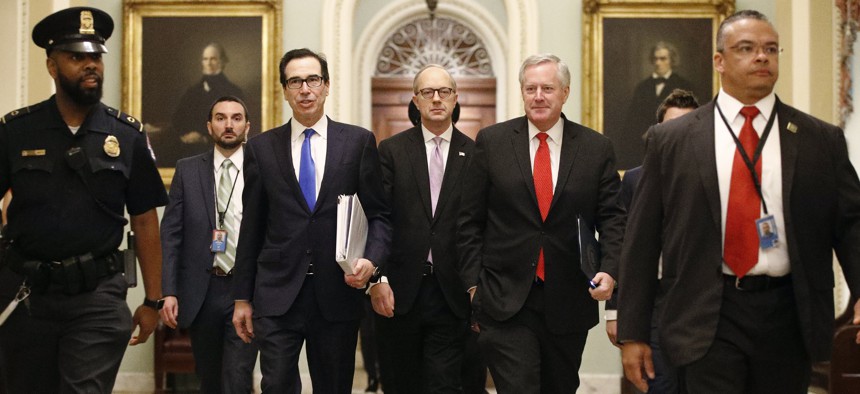Senate, White House Reach Deal on Third Coronavirus Package

Treasury Secretary Steven Mnuchin, left, accompanied by White House Legislative Affairs Director Eric Ueland and acting White House chief of staff Mark Meadows, walks to the offices of Senate Majority Leader Mitch McConnell on Capitol Hill in Washington. AP Photo/Patrick Semansky
Negotiations between Senate and House leaders and the Trump administration ended Wednesday morning with a deal on the nearly $2 trillion economic stimulus proposal.
The Senate and the White House reached a deal on a third coronavirus aid package overnight on Wednesday that is expected to provide nearly $2 trillion in health care funding and economic relief.
"At last, we have a deal," said Sen. Majority Leader Mitch McConnell, making the announcement around 1 a.m. Wednesday on the Senate floor. "After days of intense discussions, the Senate has reached a bipartisan agreement on a historic relief package for this pandemic."
The text of the legislation, hailed by Senate Minority Leader Chuck Schumer as "the largest rescue package in American history," had not been released Wednesday morning. Still, McConnell said he expected a Senate vote on the aid package later in the day.
A key provision in the legislation will provide direct cash assistance payments to many American workers, regardless of whether or not they have lost their jobs as a result of the outbreak. The bill is also expected to provide $150 billion for state and local governments, in addition to an expansion of benefits for people forced out of work that would be paid for by the federal government rather than states.
On Tuesday, Schumer said the bill was being crafted to have “unemployment insurance on steroids.” The plan would incentivize businesses to furlough workers, rather than lay them off, so they could maintain employer-provided health insurance.
The plan outlined by the Democratic leader called for the federal government stepping in to provide workers with unemployment benefits of $600 a week for four months in addition to what state unemployment programs pay.
“It will put money into the hands of those who need it so much because they’ve lost their jobs,” Schumer said on the Senate floor.
Senate Republicans drafted the bill, but were forced to include more provisions sought by Democrats after lawmakers failed to win the 60 votes needed to advance the legislation over the weekend and again on Monday. Lawmakers worked furiously Tuesday to close the gap on party priorities for the legislation, with Democrats pressing for more aid to workers and Republicans calling out progressive “wish list” inclusions in a Democrat-authored proposal in the House. \
Anticipation of a deal drove the stock market up Tuesday, with the Dow Jones industrial average surging more than 11% in one day.
“This package will be the single largest Main Street assistance program in the history of the United States,” said White House Economic Advisor Larry Kudlow during a Tuesday afternoon press conference at the White House.
The coronavirus relief package under negotiation is the largest of three recent aid packages drafted by federal lawmakers to address health and economic concerns amid the outbreak. The legislation follows on the heels of an initial $8.3 billion bill that provided funding for federal, state and local healthcare systems and vaccine development, and a House-led $104 billion package that established paid emergency and sick leave for those affected by the coronavirus outbreak.
The Trump administration was heavily involved in negotiations on the deal, with Treasury Secretary Steven Mnuchin traversing Capitol Hill and on dozens of phone calls with Senate and House leaders.
Administration officials said the aid package was necessary to help revive the American economy after the epidemic passes.
“We are heading for a rough period but it is only going to be weeks, we think, weeks and months,” Kudlow said. “It’s not going to be years, that’s for sure. This will hopefully pave the way for continued economic recovery after this crisis.”
Even as they appeared to be coming to agreement behind closed doors, Republicans and Democrats publicly sparred over the type of aid and oversight necessary for the deal. An original Republican version of the bill provided $500 billion in economic stabilization loans and loan guarantees for state and local governments and businesses, but few stipulations on how the money could be spent and little oversight.
Democrats sought more oversight of what was derided as a “slush fund” while seeking to carve out specific funding that would be earmarked for state and local governments.
Republicans, meanwhile, picked apart a House proposal that they said included too many irrelevant provisions, ranging from $35 million to support the John F. Kennedy Center of the Performing Arts in Washington, D.C. to requirements that states allow early and absentee voting in upcoming elections.
"Here are some of the items on the Democratic wish list over which they chose to block this legislation last night: tax deductions to solar energy and wind energy; provisions to force employers to give special new treatment to big labor; and, listen to this, new emissions standards for the airlines," McConnell said during a speech Tuesday morning on the Senate floor. "Are you kidding me?”
OTHER STORIES from Route Fifty:
-
Activists and Lawmakers Call for an End to Ban on Gay Men Donating Blood
-
Salt Lake City Cracks Down on Large Groups Greeting Missionaries at Airport
-
Disasters Collide: How the Pandemic Will Affect Response to Natural Disasters
-
States and Cities Turn to Empty Hotel Rooms to House Homeless and People Ill With Coronavirus
NEXT STORY: Why Trump Isn’t Using The Defense Production Act





